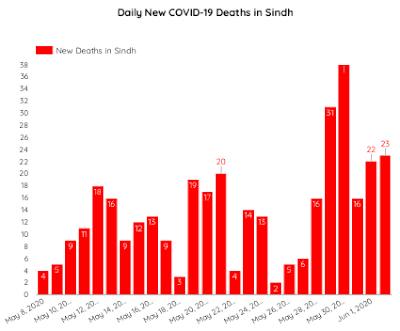By Mukhtar Alam
(Pakistan News & Features Services)
Amidst citizens’ concerns over the increasing pile of COVID-19 fatalities, the Sindh government on June 3 confirmed 29 more deaths of coronavirus patients across the province while the province’s one day new infection tally set a new record with 1,824 cases which was 27% higher than the preceding day’s 1,439 positive cases besides being the highest-ever single day figure.
The data showed that, on an average, 25 patients died at hospitals and homes every day in the province during a period from May 28 to June 3. Sindh’s overall death tally stood at 555 on June 3.
The experts reached by PNFS, on the condition of anonymity, reflected that the government appeared to be working direction less in tackling the crisis.
“The government side frequently blamed the masses for its failure to containing the diseases despite passage of over three months but did not speak a word about the hospitals where deaths of numerous COVID-19 patients are occurring every day,” a senior physician observed.
He explained that auditing, according to international norms, is a means for improving the quality of patient care and outcomes by systematic review of clinical management and comparing outcomes against criteria or accepted standards of care. In a mortality audit (or review) data are collected on deaths, and a qualitative and quantitative review is conducted.
A senior microbiologist commented that the hospitals were saying they were full which meant lack of required number of beds, ventilators, trained doctors, technicians while on the other hand, there was more mixing of population, more relaxation, more infection and more recovery.
A philanthropist and a civil society activist appearing concerned over the increasing number of deaths and infections regretted that the policy makers have really messed up the country’s coronavirus management.
“There is neither any seriousness on the issue of increased deaths nor any convincing move to reduce the every day’s infection rate,’ the activist added.
An official data, updated on June 2, revealed that of the 203 admissions, at the Aga Khan University Hospital, 48 patients were cured while 52 died due to the lethal disease. Similarly, at the Civil Hospital Karachi 37 were cured, 42 died, out of 183 admissions, at Indus Hospital 17 were cured while 43 died out of 89 admitted patients.
At Jinnah Postgraduate Medical Centre 16 got cured, while 62 lost lives, out of 118 admissions; at Dow University hospital 38 were cured out of 197 admissions, while the death toll came as 64 there.
Sindh Institute of Urology and Transplantation cured 34 of the 179 admissions, while 55 died; at Ziauddin Hospital 16 cured, 26 lost life, out of 67 admissions; at PNS Shifa 38 out of 153 admissions were cured, while 14 died; at LUMHS Hyderabad 30 cured while 12 died of the 80 admissions.
The COVID-19 patients who died at Karachi, during last 24 hours, included 19 men of age ranging from 45 to 80 years and eight women of age ranging from 21 to 72 years. Shikarpur reported death of a woman aged 55 years, while a 55-year-old man died at Khairpur.
Of the 1,824 new cases, detected during the last 24 hours ending at 9 am June 3 in the province, 1,487 belonged to Karachi, followed by 73 belonging to Hyderabad, 62 to Sukkur, 49 to Larkana, 36 to Ghotki, 24 to Shikarpur; 13 to Kashmore; 13 to Jamshoro; 10 to Kambar Shahdadkot.
The Sindh Chief Minsiter, Syed Murad Ali Shah, in his routine message said that 367 COVID-19 patients were in severe condition, out of which 56 were on ventilators. As many as 1152 patients were receiving treatment at hospitals across the province, while 15,070 were being treated at homes and another 111 were admitted at isolation centres.
In the meantime, an additional 42-bed high dependency unit (HDU) was made functional at the Civil Hospital Karachi, which already had 12 intensive care beds with ventilators, 55 HDU beds and 35 isolation beds.
On the other hand a senior consultant physician at Aga Khan University Hospital called for improving the coordination between the COVID-19 hospitals. In a statement, Prof Javed Khan, consultant pulmonologist said that physicians were faced with a major problem in treating coronavirus patients.
“Today I saw six patients in my clinic. Most were having mild symptoms so I advised them home quarantine, but two of the patients had COVID pneumonia with low oxygen saturation. At AKU we had no bed to admit. I rang three other hospitals but could not get connected,” he revealed.
In a situation like this, according to Prof Javed Khan, there emerged a room for operating a central hot line, under the supervision of the Sindh health department, which can gather information from all private and public sector hospital and then provide this to any doctor who needed to find out where the bed or the ventilator was available. “It’s very difficult for a sick patient to go from one hospital to another and finding no bed available,” he highlighted.









